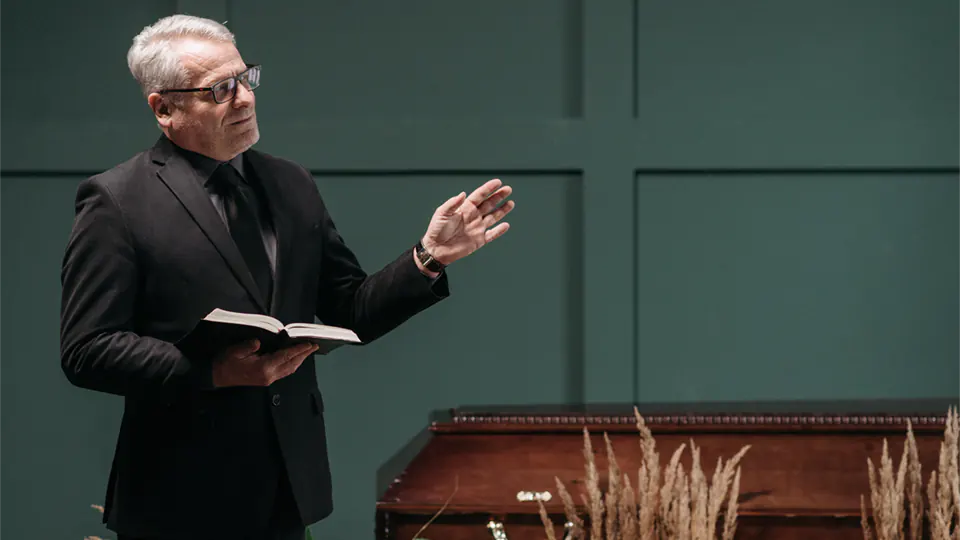Funeral Service
When it comes to booking a funeral the service is one of the most meaningful parts. Many people are unaware that it will save them money to pay a spokesperson or religious person of their faith directly and not through the undertaker. Learn about the different types of funeral services, cost-saving strategies, and how to plan a service that honours your loved one’s memory.
Table of contents
What is a funeral service, and why have one?
- A funeral service is an important way of saying goodbye to a loved one and celebrating their life
- It usually includes a eulogy (a speech about the deceased).
- There may also be additional speeches and tributes from mourners, often family members or close friends
- These tributes honour the life of the deceased
- The service provides a sense of closure and comfort for family and friends
Spokesperson to read the eulogy

Religious funeral service
To book a religious spokesperson, ask the undertaker who they use for cremation or burial service; then go directly to that person. Alternatively, visit your church or place of worship to arrange the service. The Salvation Army often conducts funeral services in exchange for a donation, which can be arranged through their head office.
Non-religious funeral service
If you prefer a non-religious funeral service, you could use a Humanist. Humanists can be contacted directly through the British Humanist Association. They can also offer religious activities such as a hymn or music of praise, provided there is no act of worship.
Similarly, Celebrants offer non-religious services that can also include religious acts in the service. Celebrants can be contacted through their Funeral Celebrant head office.
Funeral order of service
The order of service typically includes several standard elements to guide the mourners and spokesperson reading the service, such as:
- Introduction: This may include a welcome message from the spokesperson or a brief statement about the purpose and significance of the service.
- Hymns or music: This section lists the hymns, songs, or instrumental music that will be played during the service.
- Prayers or readings: This section includes any prayers, readings, or poems that will be recited during the service. It may also include personal tributes from family members or friends.
- Committal: This section typically includes the final words of farewell and any final blessings or prayers.
- Closing: This section may include a final hymn or song, as well as information about any post-funeral gatherings or events.
The exact format and content of the order of service can vary depending on the cultural and religious traditions of the deceased and their family, as well as personal preferences and requests. It is often created in collaboration with the spokesperson or clergy member, and the family members of the deceased.
Planning the service
Planning a funeral service can be overwhelming. Here are some steps to help you plan a funeral service:
- Choose the type service, religious or not
- Think about your budget for the service
- If possible decide on the venue, and time of service that suits most attendees
- Choose the music and readings for the service
- Decide who will read the eulogy and / or tributes
Cost-saving tips
- Book the spokesperson directly and through an undertaker
- Create your own order of service using templates
- Consider having the service in a community hall instead of a crematorium/burial location
- Use recorded music instead of live musicians
FAQ’s
How much does a funeral service typically cost in the UK?
Funeral service costs vary but booking directly is around £80–£300.
What’s the difference between a Humanist and a Celebrant?
Humanists conduct non-religious services only, while Celebrants can include religious or spiritual elements.
Can I design and print my own order of service?
Yes, you can use free or paid templates to create your own order of service, which can significantly reduce costs.
Do I have to use a funeral director to arrange the service?
No, you can save money and book a spokesperson, venue, and music directly.
Summary
The funeral service is the main part of the saying goodbye and one of several funeral disbursements you can control. By arranging a spokesperson directly and printing your own order of service, you can reduce funeral costs without compromising the dignity or meaning of the occasion.
Step 1: Low-Cost Funerals
Step 2: Funeral Service
Step 3: Coffin Prices
Step 4: Funeral Wake Ideas
Step 5: Home & Natural Burial
For further helpful information covering different aspects of funerals from poems, flowers, bereavement gift ideas, what to wear at a funeral, low-cost headstones and much more, visit the Save Funeral Costs™ blog.

